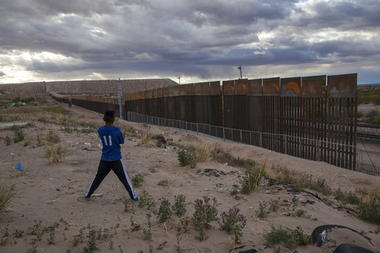Most Americans oppose funding border wall

WASHINGTON (AP) — Most Americans oppose funding President Donald Trump's wall along the U.S.-Mexico border, according to a poll released Thursday by The Associated Press-NORC Center for Public Affairs Research. The president gets higher marks for efforts to boost defense spending and beef up the border patrol.
Even many of Trump's supporters reject his proposed budget cuts to scientific and medical research, the poll found.
The poll results come at a crucial time. Congressional Republicans and Democrats are wrestling over whether to include a down payment for the wall — financed by U.S. taxpayers instead of Mexico, despite Trump's repeated promises — in the spending bill to keep the government open at the end of the month.
The poll offers a mixed view of Trump's budget plan, which drew criticism from Republicans and Democrats on Capitol Hill. Americans supported cuts to foreign aid, but opposed Trump's planned cuts to spending on environmental programs and fighting climate change. People were more likely to oppose than favor cutting federal help for public broadcasting and the arts and by huge margins supported additional money for veterans' programs.
"The military is depleted, and the veterans have been hurting," said Margaret Hall, 77, a Trump supporter from Ft. Lauderdale, Florida.
Trump's spending plans are facing their first test on Capitol Hill, as lawmakers debate his request for $30 billion for an immediate cash infusion for the military and $3 billion for additional border security, including a $1 billion down payment for new fencing and other barriers along the U.S.-Mexico border.
The public opposes new spending for the wall, 58 percent to 28 percent. Nearly half say they strongly oppose funding for the project.
"I honestly think the wall is going to be a fiasco. If they want to get into the country, they're going to get into the country, regardless of what you put up there," said Wes Drought, 61, a firefighter and paramedic from Winnebago, Illinois, who strongly disapproves of Trump. "If you're going to do something, do it with the border patrol. If you want to create jobs, there's a job."
Democrats have come out strongly against the wall construction, and some Republicans are signaling they're not interested in a confrontation.
"I don't like the concept — I don't think it's needed — of a 2,000-mile wall as some envision," said Sen. Jeff Flake, R-Ariz., whose state is home to some of the most rugged terrain along the border. "It's just not needed. In some areas you just don't need it. In some areas you need wall, in some areas you need fences. In some areas you need surveillance."
Testifying on Wednesday, Homeland Security Secretary John Kelly said the wall won't be from "sea to shining sea," but in places where border agents say it would be most effective. He said the wall could extend beyond a physical barrier and include a mix of technology including drones.
Eighty-six percent of Democrats and 57 percent of independents oppose new spending for a border wall with Mexico. Republicans break about 2-1 in favor of the wall, but that's more narrow support than on other priorities.
The most popular proposal by far in the Trump budget is increasing spending on Veterans Affairs, which is supported by 74 percent of Americans and opposed by just 8 percent.
Americans are also more likely to favor than oppose increased spending on border patrol (50 percent to 32 percent) and decreased spending on foreign aid (50 percent to 30 percent). By a 47 percent to 34 percent margin, more also favor than oppose increasing spending on defense and the military.
But other pieces of the proposed Trump budget draw negative reviews. By a 64 percent to 19 percent margin, most oppose decreasing spending on scientific and medical research. That's a complaint echoed by Republicans and Democrats in Congress, including the Senate Majority Leader Mitch McConnell, R-Ky., who holds significant sway as Congress uses the president's proposal as a blueprint but writes the budget.
Most Americans also oppose cuts to spending on the environment and on climate change, by a 52 percent to 28 percent margin. Finally, Americans are more likely to oppose than favor cutting spending for public television, radio and the arts, 44 percent to 32 percent.
Large majorities across party lines favor increasing Veterans Affairs spending, although Republicans are particularly supportive. And decreasing spending for scientific and medical research is largely opposed across party lines, by 78 percent of Democrats, 58 percent of independents and 51 percent of Republicans.
But there are large political divides on several other pieces of the budget proposal. Seventy-five percent of Republicans but just 40 percent of independents and 26 percent of Democrats favor increased military spending. Eighty percent of Republicans and 49 percent of independents, but just 26 percent of Democrats, favor increased border patrol spending. And 72 percent of Republicans and 54 percent of independents, but just 30 percent of Democrats, favor decreased foreign aid spending.
___
The AP-NORC poll of 1,110 adults was conducted March 23-27 using a sample drawn from NORC's probability-based AmeriSpeak panel, which is designed to be representative of the U.S. population. The margin of sampling error for all respondents is plus or minus 4.0 percentage points.
Interviews were conducted online and using landlines and cellphones.
___
Online:
AP-NORC: http://www.apnorc.org/
_
Copyright 2017 The Gayly - 4/6/2017 @ 8:24 p.m. CDT





